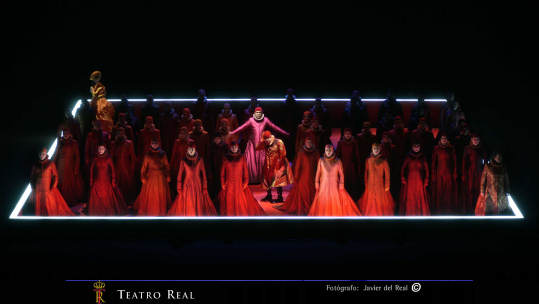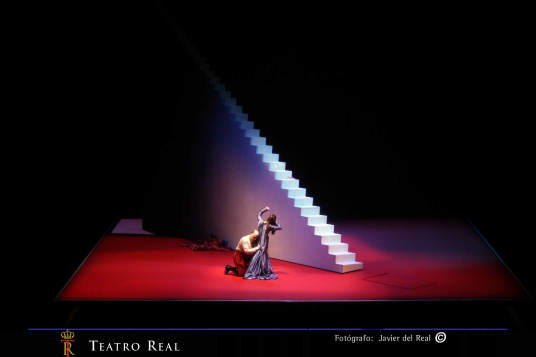Other Links
Editorial Board
-
Editor - Bill Kenny
-
Deputy Editor - Bob Briggs
Founder - Len Mullenger
Google Site Search
SEEN AND HEARD
INTERNATIONAL OPERA REVIEW
Verdi, Rigoletto:
Soloists, Orquesta Sinfónica de Madrid. Coro Intermezzo.Conductor: Roberto Abbado. Teatro Real de Madrid. 3, 4 & 5. 6. 2009. (JMI).
Production from De Nederlandse Opera Amsterdam in co-production with Teatro Real and Barcelona’s Liceu.
Director: Monique Wagemakers.
Sets: Michael Levine.
Costumes: Sandy Powell.
Lighting: Reinier Tweebeeke.
Casts:
Rigoletto: Roberto Frontali/Zeljko Lucic/Anthony Michaels-Moore.
Gilda: Patrizia Ciofi/Mariola Canatarero/Cinzia Forte.
Duke: José Bros/Roberto Aronica/Celso Albelo.
Sparafucile: Marco Spotti/Stefano Palatchi.
Maddalena: Nino Surguladze/ Enkelejda Shkosa.
Monterone: Luiz-Ottavio Faria/Luciano Montanaro.
Giovanna: Mercè Obiol.
Marullo: David Rubiera.
Borsa: Ángel Rodríguez.
Count Ceprano: Tomeu Bibiloni.
Countess Ceprano: Marta Ubieta.
Page: Graciela Armendáriz.

Programming Rigoletto at the Teatro Real had much to do with the Juan Diego Flórez’ initial interest in sing Il Duca de Mantova there, after his first experiences in the role in Lima and Dresden. The case was though that the Peruvian star was not too happy with his Duca or with the consequences of continuing to sing this for his voice. He decided last summer temporarily to drop the role from his repertoire and, consequently, to cancel his commitment to the Teatro Real. This was an intelligent decision without a doubt but on the other hand it left very uncomfortable situation for the Madrilenian theater which saw its biggest crowd-puller of the season all but disappear.
Following Florez’ cancellation, the casting for Rigoletto became a kind of musical chairs, since the change of singers for the different casts has been almost constant. The disappearance of JDF was followed by a cancellation by Leo Nucci with a total defection avoided in extremis with the commitment of the Italian baritone to appear at the Teatro Real to sing only one performance (June 22). Of the Dukes initially announced (JDF, Bros and Meli) only Bros remained, with Fabio Sartori having also been promised although finally he too cancelled. In the end Roberto Aronica and Celso Albelo joined José Bros. But as misfortunes seem to be contagious, there were also problems with the sopranos. Inva Mula was announced as Gilda, although she was not apparently to keen to take again this role, and probably the fact that JDF and Nucci had cancelled persuaded her to follow them.
The production now offered at teh Teatro Real comes from Amsterdam, where was premiered 5 years ago with stage direction by Monique Wagemakers. The production is modern, colourful and minimalist and all the sets consist simply of a large platform, by no menas easy to move, on which the whole action takes place. The only other stage element is a huge ascending staircase in Rigoletto’s house, a kind of Jacob’s ladder. The different scenes are sometimes confusing, since it is necessary to play the drama on the bare surface of the platform and the void underneath it. This present day trend towards minimalist productions has often to do with cutting budgets, which does not seem to apply to this production, because it doesn’t look particularly cheap. The costumes are quite original , more or less what you might expect from the Mantuan court, but with a distinctly Dutch touch, particularly for the Chorus. The lighting is probably the production's biggest
strength. A work staged with these characteristics requires outstanding direction of the actors and here this works
well in general, although not quite all the time. Ms. Wagemakers gives the Chorus (all the members similarly dressed) an important role here: it sings and observes the drama in the manner of a Greek tragedy. The production is original and attractive from an aesthetic point of view, but it lacks enough depth to fully convince.

These first performances were not exactly a triumph, although things have been improving steadily form the night of the premiere. The biggest problem has been some erratic musical direction from Roberto Abbado. His tempos were out of the ordinary and too slow in general, creating quite a problem for the singers on stage. Some of them were able enough to cope with the difficulties coming from the pit, while others were less successful. At the premiere there was a strong feeling of insecurity from the singers, which eased in the following performances. Mr. Abbado’s tempos not only created problems to singers however, but in general his reading fely rather boring at more than one point. “Veglia, o donna”, “Caro Nome” and “Zitti, ziti” were not models to be followed. The Orchestra was also not very good at the first night, although things improved for them too in the later performances. Coro Intermezzo replaced the Teatro Real’s own chorus, who are having a labour dispute with the management at the moment. They were quite good.
Of the three Rigolettos, Serbian Zeljco Lucic was the best. He is one of the very few with a voice suited to the main Verdi baritone roles. He had some problems here and there with the conductor, but he knew how to handle things. Lucic is not the most nuanced baritone one can dream of, but he is a good Rigoletto, even able to move the audience, particularly in “Cortiginani”. Roberto Frontali was a true disappointment the first nigh of the run. His voice is not for Rigoletto, he created little or no emotion and he had too many problems with Roberto Abbado , offering a very tight top to his singing. Anthony Michaels-Moore is a guarantee in the role: while the voice is not particularly beautiful, it is certainly well suited for Rigoletto and he is expressive and powerful. He was also able enough to solve the problems that the slow tempos caused in “Veglia o, donna”. I think it is fair to recognize that Teatro Real has offered for Rigoletto the best that the market can provide today though, provided that Nucci shows up, and considering that Carlos Alvarez is still out of business. It’s all rather, but there is very little water left to run under this particular bridge.
We had again three different Gildas and of whom none was fully convincing. Patrizia Ciofi showed once more that she has an extraordinary ability to communicate with the audience and she is not an artist to be taken in parts, unless you want to be. To me, hers was not a very bright performance. “Caro Nome” was an exhibition of constant stops for breath, in part due to Abbado’s tempos, although her colleagues were able to solve the problems much better. She even dodged the high E at the end of ‘La Vendetta’. There was no sound at all. Mariola Cantarero was too ethereal and artificial a Gilda, with a sometimes beautiful pianissimo but there were some notes bordering on shouting. She was decent enough in the first part, but not quite up to the second. Cinzia Forte offered a very good Gilda up to Caro Nome, while seeming too light a voice for “Tutte le feste al tempio”, in which she offered an annoying vibrato. I did much not like the way she took her final bow, trying to prolong the applause as if nobody else was in the cast – at least that’s how it appeared.
The young tenor Celso Albelo was the last Duca di Mantova to be cast by Teatro Real and he was by far the best of them. He has everything necessary in order to become a major figure. His voice is beautiful, very well projected, quite homogeneous and he sings very expressively. His top is just outstanding. He was excellent both in the aria “Parmi Veder” and “La Donna è Mobile”. He never flinched from the very high notes, showing an impressive high D flat at the end of the cabaletta, that was not only bright, but also long, very long in fact. He finished with an outstanding diminuendo at his last internal “Di pensier” If he learns to say NO to too many engagements, he can be a very important tenor. At the moment, Il Duca is right up to his limits. Jose Bros was not at his best on the first night and he offered a disappointing performance, sounding particularly tight at the top. Robert Aronica was more powerful than nuanced. He too avoided the high notes both in his duet with Gilda and in the cabaletta.
Marco Spotti was a good Sparafucile, while Stefano Palatchi was below par. Nino Surguladze was an attractive Maddalena on stage, with a pleasant voice, though not too large. Enkelejda Shkosa was none too interesting in the role while Luiz Ottavio Faria and Luciano Montanaro were both sonorous Monterones.
There was a full house for each of the performances but there was no great excess of enthusiasm for any of them. Only Celso Albelo was able to draw out ovations after the cabaletta “Possente amor” and “La Donna è mobile”. At the final bows the warmest reception was shared by Zeljco Lucic, Celso Albelo and the three Gildas.
José M Irurzun
Pictures © Javier del Real
Back to Top
Cumulative Index Page
